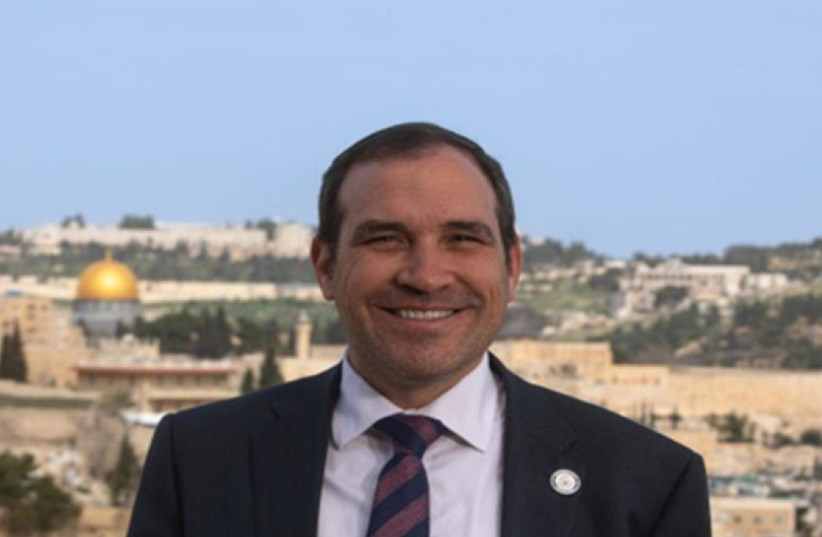The conviction of former US President Donald Trump last week has set off a firestorm of controversy in the United States. Some accuse the justice system of being “weaponized,” while others argue that although no US law prevents the convicted former chief executive from running for president once again, he should withdraw.
In Israel, engaged in its battle against the terrorist organization Hamas and largely dependent on America for negotiating the release of its hostages, many citizens worry that the court’s decision could weaken the US and further jeopardize regional stability.
For more stories from The Media Line go to themedialine.org.
Trump was found guilty last Thursday on 34 felony counts of falsifying business records related to payments made to adult film actress Stormy Daniels to keep her silent about their alleged affair.
“This trial will cause a huge swath of society to lose trust in the courts, whether it is a legitimate [verdict] or not,” Israeli settlement activist and blogger Malka Fleisher told The Media Line. “It is so polarizing.”
Originally from Texas, she said that “conservative, patriotic America—with its family values and belief in life, liberty and the pursuit of happiness—has been a long-time value for Israel. To see another piece of beautiful America chopped is sad. A weakening America is bad for Israel and the world.”
Another American-Israeli citizen, Laura Ben-David, who now lives in Jerusalem, expressed concern that the former president’s conviction would encourage the anti-Israel world to draw parallels between Prime Minister Benjamin Netanyahu and Trump—and the political challenges in both countries.
Although Netanyahu has not been convicted, the prime minister is on trial for bribery, fraud, and breach of trust. His trial has been ongoing through multiple elections, security operations, and the recent war.
“People don’t see Netanyahu as [positively] as in the past, and there are a lot of parallels between how both leaders just want to be in power and do not seem to be thinking of the good of the country,” Ben-David said. “Israel and the Jewish people are divided on Trump. … It’s hard to wrap my head around a convicted person being in charge of a country that is our strongest ally. It is very hard to put my faith in someone like that despite all he has done for us.”
She, too, noted a concern that the conviction would “erode the public’s faith” in the judicial system.
Immediately following the verdict, some Republican leaders vehemently criticized the courts, accusing them of making a biased decision solely because the defendant was Trump.
“Today’s verdict represents the culmination of a legal process that has been bent to the political will of the actors involved: a leftist prosecutor, a partisan judge, and a jury reflective of one of the most liberal enclaves in America—all in an effort to ‘get’ Donald Trump,” said Florida Governor Ron DeSantis in a statement. “If the defendant were not Donald Trump, this case would never have been brought, the judge would have never issued similar rulings, and the jury would have never returned a guilty verdict.”
Similarly, House Speaker Mike Johnson said, “The weaponization of our justice system has been a hallmark of the Biden Administration, and the decision today is further evidence that Democrats will stop at nothing to silence dissent and crush their political opponents.”
Middle East Perceptions
Regionally, there could also be repercussions, according to Aryeh Lightstone, who served as senior adviser to the US ambassador to Israel from 2017 to 2021 and was tasked with implementing the Abraham Accords. Lightstone, a Trump supporter, called the decision “terrible” and said that such a ruling could harm America’s esteem in the Middle East.
“It knocks us further down in terms of being a reliable and sensible partner,” Lightstone said. “We look like a banana republic.”
He said that since the start of the Hamas war, Israel’s Abraham Accord partners—the United Arab Emirates, Bahrain, and Morocco—as well as countries considering normalizing ties with Israel, such as Saudi Arabia, have been closely watching the US response to the conflict. He said that the American administration’s “equivocating” on its public stance on Israel against Hamas, the country’s failure to sanction the International Criminal Court, and its brief halting of arms shipments to Israel, among other actions “have been humiliating to watch.”
America is facing enormous domestic challenges, Lightstone said, and “what it does for our esteem in the Mideast is that knocks it further down in terms of being a reliable and sensible partner.
“The Mideast countries will wait to see how the election plays out,” Lightstone continued. “I assume they would rather have a world under Trump than under Biden; look at the Middle East four years ago versus today.”
Lightstone added that if candidate Trump wins the election despite the conviction, it will bring regional respect back to the US because it will demonstrate to Mideast leaders that the strength of the US is the people and not the leadership.
Palestinian Perspectives
However, Palestinians in the region likely see things differently than Lightstone describes. Palestinian affairs analyst Khaled Abu Toameh told The Media Line that there were two leaders Palestinians living in the West Bank and Gaza detest more than anyone else: Trump and Netanyahu.
“It is a dream of most Arabs I meet to see one or both of them behind bars,” Abu Toameh said. “They have been talking about it a lot—hopefully, Netanyahu will go to prison, and they have been talking about Trump.”
While no regional leaders, including Palestinian President Mahmoud Abbas, officially responded to the conviction, Abu Toameh said there was an extensive reaction in Arabic on social networks.
“People are elated,” he said. “Their biggest fear is that [Trump] will return to power, and they don’t want him back.”
The Palestinians described Trump as the most hostile US president ever. Trump recognized Jerusalem as Israel’s capital and moved the US embassy from Tel Aviv to the holy city while he was president. He also recognized the Golan Heights and deemed the West Bank settlements not illegal, among other moves. At the same time, he cuts millions in aid to the Palestinians.
“It is not like they [the Palestinians] are very happy with Joe Biden. He is just the lesser of two evils,” Abu Toameh admitted. However, he said the Palestinians hope Trump’s conviction “is the beginning of his downfall.”
Polling Insights
Several polls conducted after the ruling have raised questions about Trump’s chances in the upcoming election. While many Republican leaders believe the verdict may boost his prospects, others suggest that Americans might now be uneasy about returning Trump to the White House.
A Reuters poll released over the weekend revealed that 10% of registered Republican voters were less likely to vote for Trump following his conviction. The poll also found that 56% of these voters said the case would not affect their vote, while 35% indicated they were more likely to support Trump.
Among registered independent voters, who are crucial for Trump’s election chances due to the smaller number of Republican voters compared to Democrats, 25% said the conviction made them less likely to support him in November. In contrast, 18% said they were more likely to vote for him, and 56% stated the conviction would not influence their decision.
A separate ABC News/Ipsos poll found that 50% of Americans believe Trump’s guilty verdict was justified, and 49% think he should withdraw from the 2024 presidential race because of it. The opinions vary significantly by party affiliation: 83% of Democrats agree with the verdict, and 79% believe he should end his campaign, whereas only 16% of Republicans think the verdict was correct, and an equal percentage say he should drop out of the race.
How it will play out will only be known in November, as much can change in the next five months. However, Knesset Member Danny Danon (Likud) told The Media Line that the best result of the conviction might be a shift in focus away from Israel in the US election.
“Maybe now the election will be less about Israel,” Danon said, suggesting this would allow Israel to concentrate on its priorities without being in the public eye. At the same time, Americans focus more on domestic issues.


